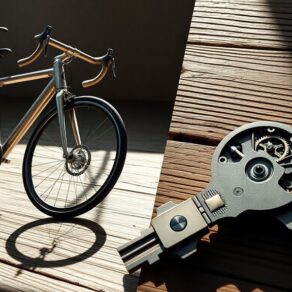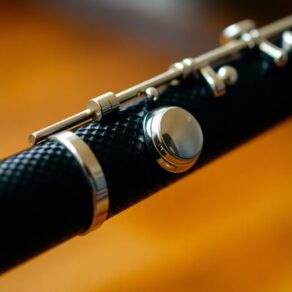When you explore carbon fiber flutes, you'll discover a lightweight yet incredibly strong option that enhances your playing experience. These flutes are designed with high tensile strength and excellent weather resistance, so you won't worry about warping in humidity. Their substantial durability guarantees they can handle the rigors of travel and performance without compromising sound quality. You'll appreciate their resonant projection and surprising tonal warmth, making them suitable for both beginners and professionals. As you consider your options, there are unique craftsmanship details and popular models to explore that can elevate your musical journey further.
Key Takeaways
- Carbon fiber flutes are significantly lighter than traditional wooden or metal options, reducing player fatigue during extended playing sessions.
- Their high tensile strength and resistance to humidity ensure durability, preventing warping or cracking and maintaining sound integrity.
- Excellent sound projection and tonal warmth allow musicians to achieve a rich, expressive performance, enhancing audience connection.
- The innovative construction and aesthetic detailing of carbon fiber flutes reflect modern craftsmanship, making them visually appealing and reliable instruments.
- Regular maintenance is easy, requiring minimal upkeep, making carbon fiber flutes a practical investment for serious musicians.
What Is Carbon Fiber?
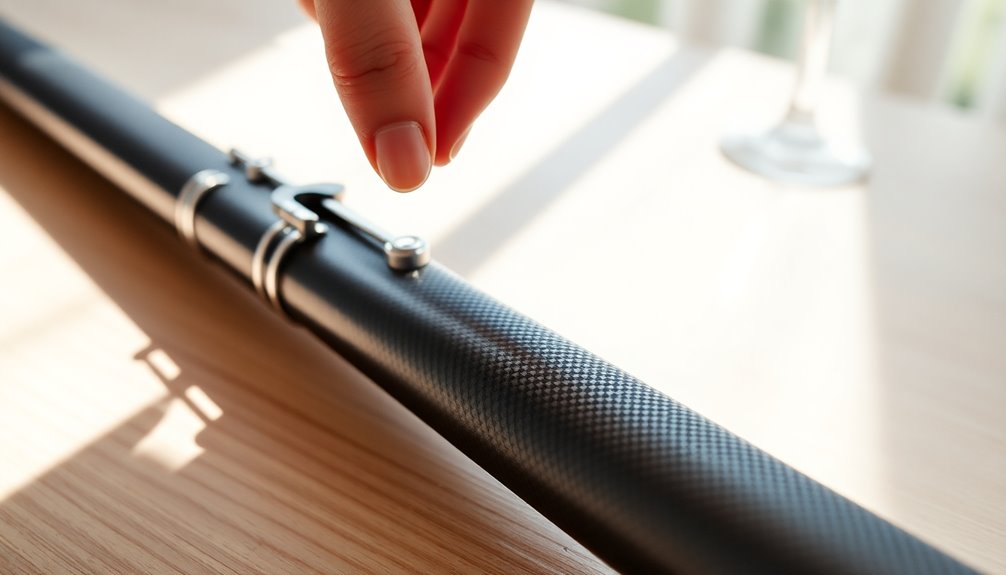
Carbon fiber is a lightweight, high-strength material composed of thin strands about 5 to 10 micrometers in diameter, primarily made from carbon atoms. This unique structure gives it remarkable carbon fiber properties, including exceptional tensile strength, stiffness, and resistance to fatigue.
When you consider its strength-to-weight ratio, carbon fiber far surpasses traditional materials like aluminum and steel, making it an ideal choice for applications where both durability and lightness are critical.
In the world of music, carbon fiber has found its way into the design of flutes. Its inherent properties allow for precise tuning and consistent sound quality, which musicians crave. The high stiffness of carbon fiber means that flutes made from this material can produce a bright, clear tone while remaining lightweight and easy to handle.
You'll also appreciate how it resists temperature and humidity changes, ensuring that your instrument performs consistently in various environments. Additionally, the use of high-grade materials in carbon fiber flutes enhances their durability and sound integrity, making them a reliable choice for musicians.
Beyond musical instruments, carbon fiber applications extend to industries like aerospace, automotive, and sports equipment. Manufacturers harness its strength and lightweight nature to create components that enhance performance and efficiency.
Whether you're an avid cyclist or an aviation enthusiast, the advantages of carbon fiber are hard to ignore. Understanding what carbon fiber is and its diverse applications can deepen your appreciation for the innovations shaping the world around you, allowing you to connect more with the materials that enhance your passions.
Advantages of Carbon Fiber Flutes
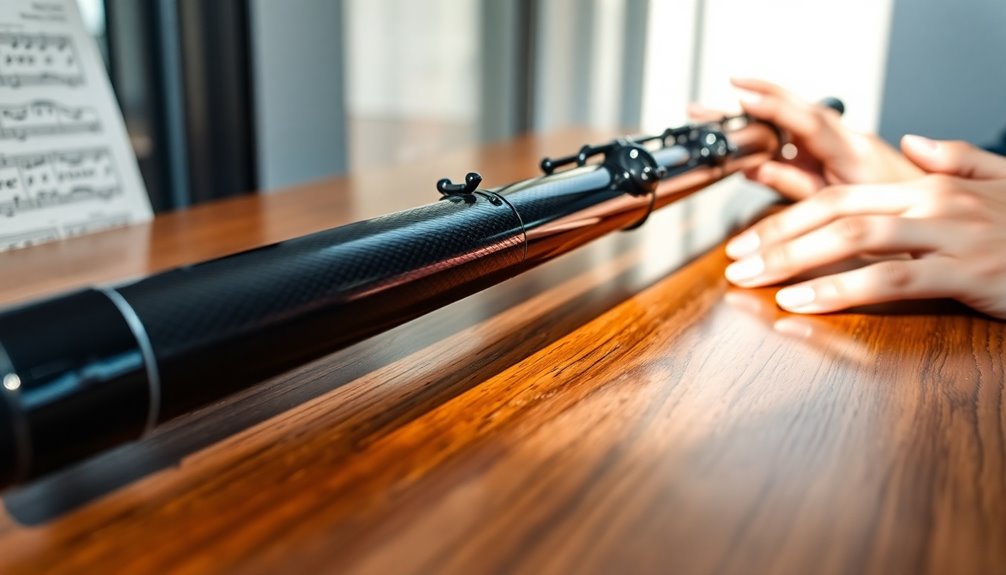
When exploring the advantages of carbon fiber flutes, you'll discover that their construction offers musicians several key benefits over traditional wooden or metal instruments.
These flutes have carved a niche for themselves in the world of music, thanks to their innovative materials and design.
Here are three main advantages you'll appreciate:
- Weight Benefits: Carbon fiber flutes are remarkably lighter than their wooden or metal counterparts. This reduced weight means you can play for longer periods without fatigue, enhancing your performance experience and allowing for greater mobility during practice or gigs.
- Durability: Unlike wooden flutes that can warp or crack with changes in humidity, carbon fiber is resilient. This durability makes your instrument less prone to damage, ensuring it maintains its quality over time, even in challenging environments.
- Cost Effectiveness: While the initial investment in a carbon fiber flute may be higher than a basic wooden model, their longevity and low maintenance can save you money in the long run. Additionally, their lightweight nature enhances playability, allowing for better control over dynamics and timbre.
You won't have to worry about frequent repairs or replacements, making it a smart choice for both novice and seasoned musicians.
Comparison With Traditional Flutes
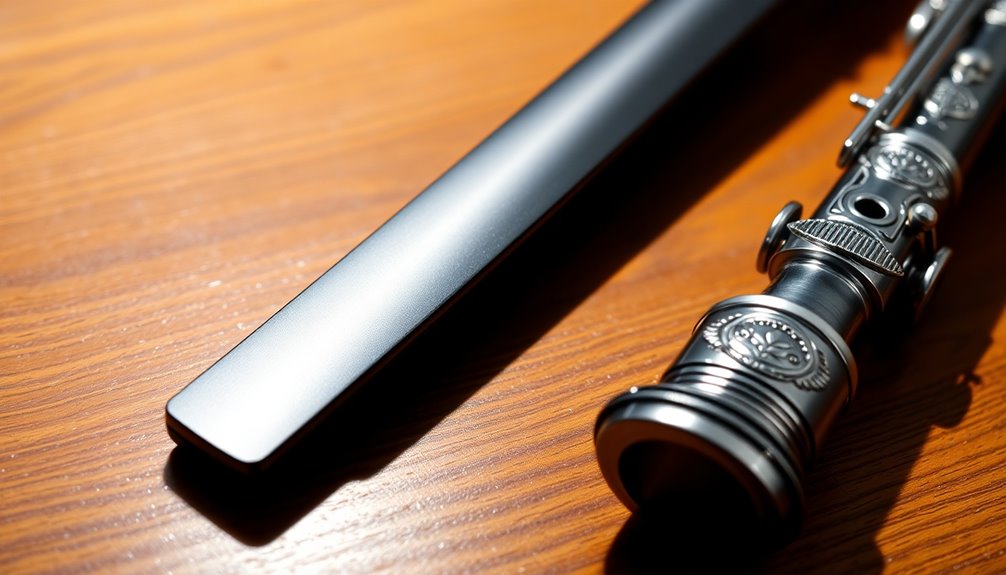
In the domain of musical instruments, comparing carbon fiber flutes to traditional wooden or metal flutes reveals distinct differences that can influence a player's choice. Traditional materials like wood and metal have been cherished for centuries, each with unique construction techniques that affect their sound and playability.
Wooden flutes, for instance, often provide a warm, rich tone, but they can be sensitive to humidity and temperature changes. This can lead to issues like warping or cracking over time, which may deter players who seek longevity in their instruments.
On the other hand, carbon fiber flutes utilize modern construction techniques that prioritize durability and consistency. These flutes aren't only resistant to environmental factors but also lighter in weight, making them easier to handle during extended playing sessions.
You might appreciate how these advancements allow you to focus on your performance rather than the maintenance of your instrument. Moreover, the design of carbon fiber flutes often incorporates ergonomic features that enhance playability. Additionally, the use of premium materials in traditional flutes can significantly impact their tonal quality and durability.
While traditional flutes have their charm, the innovative approach of carbon fiber can cater to contemporary musicians who value both aesthetics and functionality. Choosing between these two types ultimately comes down to your personal playing style and preferences.
Understanding the strengths and weaknesses of each will help you feel a sense of belonging within your musical community, whether you lean toward the classic allure of wood or the modern advantages of carbon fiber.
Sound Quality and Performance
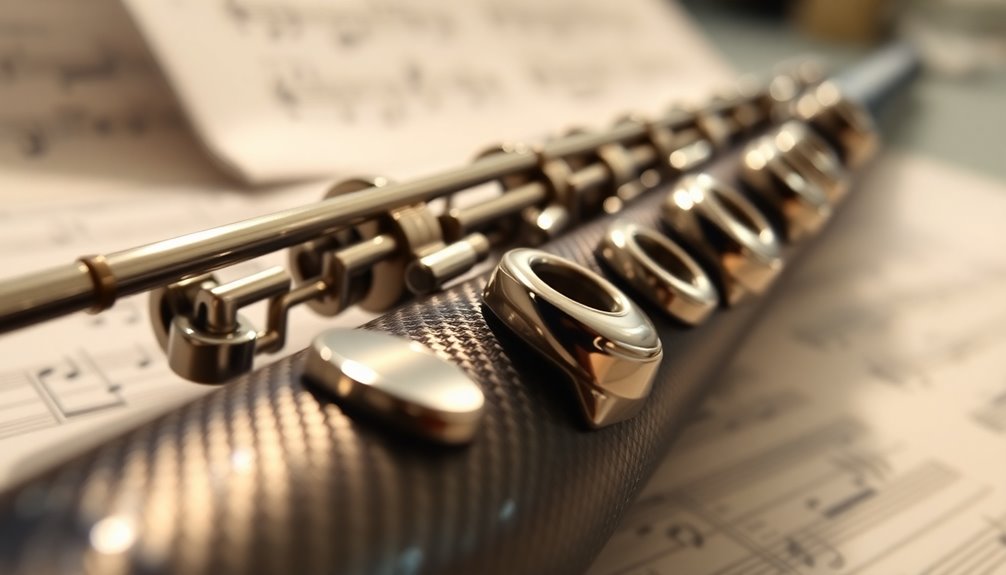
The sound quality of carbon fiber flutes presents a fascinating contrast to that of traditional instruments. As you explore these modern flutes, you'll notice some key attributes that elevate their performance. Here are three standout features:
- Sound Projection: Carbon fiber flutes excel in sound projection, allowing your music to resonate clearly across various venues. Their design enhances the ability to fill a room with vibrant sound, ensuring your notes reach every corner.
- Tonal Warmth: While carbon fiber may seem cold and mechanical, it actually offers a surprising degree of tonal warmth. You'll find that the warmth of the sound can help create rich, expressive performances, allowing your individuality to shine through.
- Dynamic Range: These flutes support an extensive dynamic range, enabling you to play soft passages delicately or release powerful, commanding tones. This versatility is essential for adapting to different musical styles and settings.
When you pick up a carbon fiber flute, you're not just holding a lightweight, durable instrument; you're embracing a modern approach to sound quality. Many musicians find that the unique combination of sound projection and tonal warmth allows them to connect more deeply with their audience. Additionally, the varied tonal qualities of different flute types can influence your choice of instrument, enhancing your musical expression. As you experiment with different techniques, you'll likely discover that carbon fiber flutes can inspire you to push your musical boundaries, fostering a sense of community among fellow artists who share this innovative experience.
Durability and Environmental Resistance
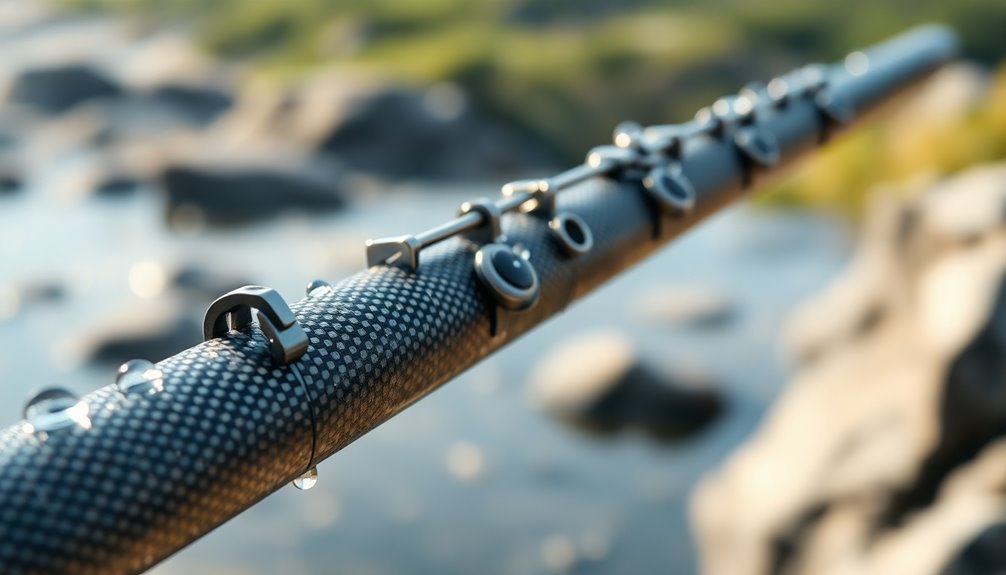
Carbon fiber flutes revolutionize durability and environmental resistance, making them a standout choice for musicians who demand both reliability and resilience. Unlike traditional wooden flutes, carbon fiber flutes excel in both weather and impact resistance, guaranteeing you can play without worrying about the elements or accidental drops.
The unique properties of carbon fiber provide a combination of lightweight construction and exceptional strength. This means your flute can withstand the rigors of travel and performance while maintaining its integrity and sound quality. Here's a breakdown of the key features:
| Feature | Carbon Fiber Flutes | Traditional Wooden Flutes |
|---|---|---|
| Weather Resistance | Excellent | Moderate |
| Impact Resistance | High | Low |
| Maintenance | Low (no warping) | High (regular upkeep) |
| Weight | Lightweight | Heavier |
| Lifespan | Long-lasting | Variable |
With weather resistance, you won't have to fret about humidity or temperature changes affecting your instrument. The carbon fiber material is inert, meaning it doesn't absorb moisture like wood does, which can lead to warping or cracking. Additionally, its impact resistance allows it to endure the bumps and knocks that often come with active performance lifestyles. Regular cleaning with flute cleaning kits ensures optimal performance and longevity of your instrument.
Choosing a carbon fiber flute guarantees that you're investing in a durable, resilient instrument that stands the test of time and environment, allowing you to focus on your music and enjoy every moment of your performance.
Craftsmanship and Design
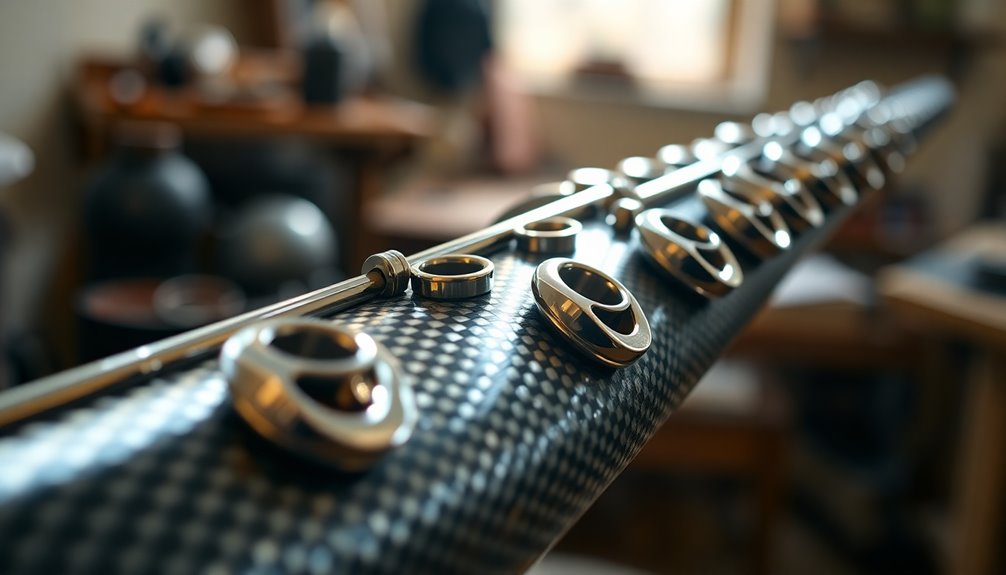
Craftsmanship in carbon fiber flutes reflects a blend of advanced technology and artistic design, resulting in instruments that not only perform exceptionally but also look stunning. Each flute showcases meticulous attention to detail through various craftsmanship techniques that enhance both playability and visual appeal.
You'll appreciate how these techniques transform raw materials into refined instruments.
Here are three key aspects of craftsmanship and design in carbon fiber flutes:
- Material Selection: The choice of high-quality carbon fiber not only contributes to the flute's durability but also allows for precision shaping. This guarantees peak resonance and a clear, vibrant tone.
- Artistic Detailing: Skilled artisans employ intricate design aesthetics, such as custom engravings and unique finishes, making each flute a work of art. This personal touch not only elevates the instrument's beauty but also provides a sense of connection for the player.
- Innovative Construction: Advanced manufacturing processes, such as layering techniques and precise molding, allow for consistent quality and performance. This innovation guarantees that you can rely on your flute for a long time, both in practice and performance.
When you choose a carbon fiber flute, you're not just opting for a modern instrument; you're embracing a piece that embodies cutting-edge craftsmanship and design. Additionally, many players find that incorporating accessories like comfort thumb rests can further enhance their playing experience.
This sense of belonging and appreciation for fine artistry in music-making fosters a deeper connection between you and your instrument, enhancing your overall experience.
Popular Brands and Models
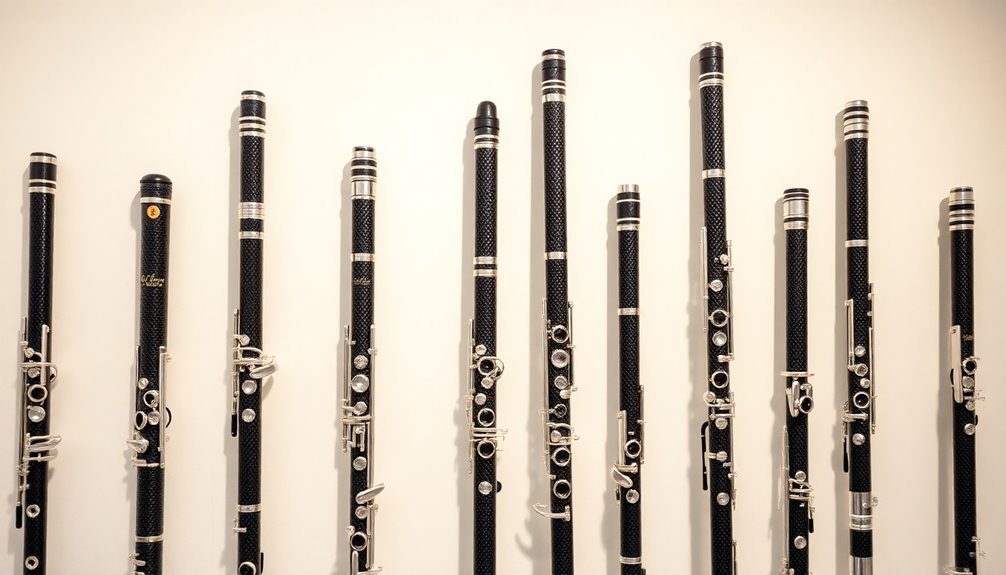
When exploring the domain of carbon fiber flutes, you'll encounter a variety of reputable brands and models that stand out for their exceptional quality and performance. Among these, Yamaha and Pearl are two brands that have made significant impacts in the carbon fiber flute market. Each brand offers unique features and craftsmanship that cater to both beginners and professionals alike.
In the table below, you'll find a comparison of popular models from Yamaha and Pearl, highlighting key specifications that can help you make an informed decision:
| Brand | Model |
|---|---|
| Yamaha | YFL-222CF |
| Yamaha | YFL-482CF |
| Pearl | PF-5050CF |
| Pearl | PF-6650CF |
| Pearl | PF-7950CF |
Yamaha flutes, like the YFL-222CF, are renowned for their bright, clear sound and responsive playability, making them ideal for students and advanced players alike. The YFL-482CF offers a more advanced mechanism, enhancing tone richness and control.
On the other hand, Pearl flutes, such as the PF-5050CF, are celebrated for their exceptional durability and precision in tuning. The PF-6650CF and PF-7950CF models provide additional features, including a solid silver headjoint, which further enriches the tonal palette. Additionally, both brands are well-regarded for their high-quality craftsmanship, ensuring that players have reliable instruments that enhance their learning experience.
Maintenance and Care Tips
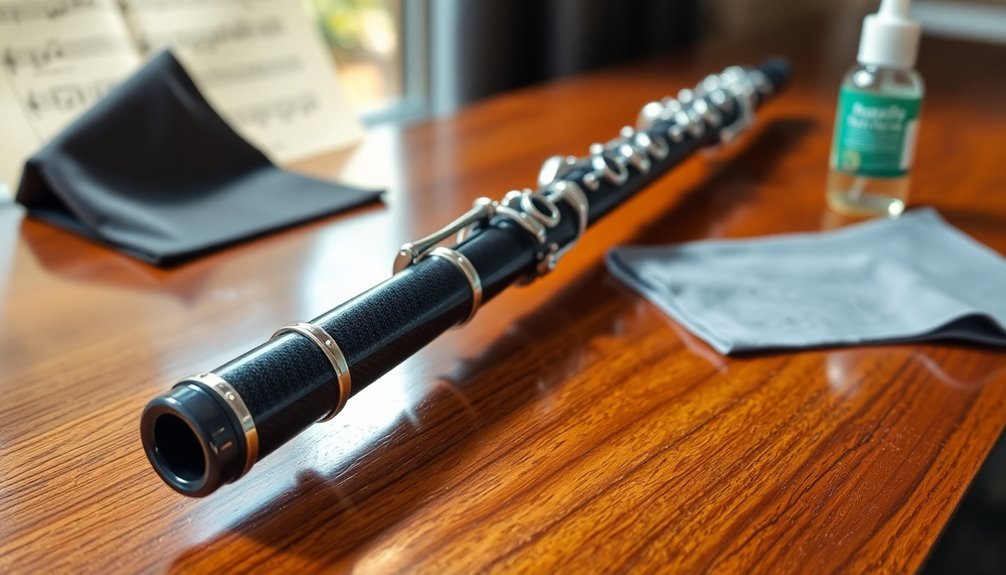
Proper maintenance is essential for ensuring your carbon fiber flute remains in ideal condition and delivers the best performance over time.
By implementing effective cleaning techniques and utilizing proper storage solutions, you can preserve the longevity and sound quality of your instrument.
Here are three vital maintenance tips to keep in mind:
- Regular Cleaning: After each use, gently clean the exterior of your flute with a soft microfiber cloth. Avoid abrasive materials that could scratch the surface. For the inside, use a cleaning rod with a cloth to remove moisture and prevent buildup.
- Proper Storage: Always store your flute in a padded case that protects it from physical damage and temperature fluctuations. Avoid placing it in direct sunlight or near heat sources, which can affect its integrity.
- Routine Inspections: Periodically check for any signs of wear or damage, such as cracks or loose fittings. Addressing these issues early can prevent more significant problems down the line. Additionally, conduct regular visual inspections to ensure that all components are functioning properly.
Choosing the Right Carbon Fiber Flute
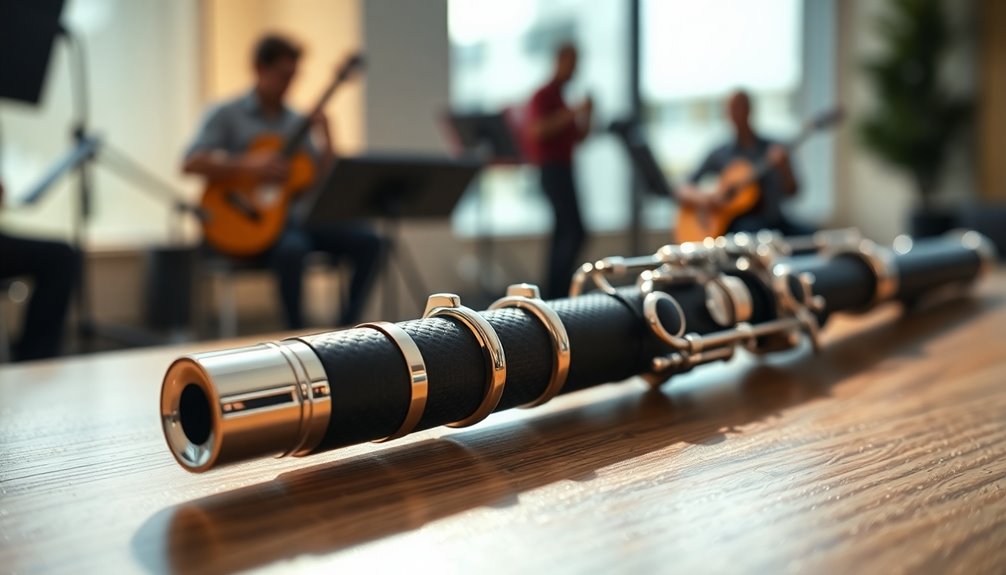
Finding the right carbon fiber flute can greatly enhance your playing experience and performance. When selecting a flute, consider specific flute features that align with your playing style and preferences.
For instance, the weight and balance of the instrument can considerably impact your comfort during long practice sessions or performances. A flute that feels too heavy or unbalanced may hinder your ability to play fluidly.
Next, think about the design and configuration of the flute. Some models offer a combination of open and closed holes, which can cater to varying player preferences. Open-hole flutes often provide more nuanced control over tone, while closed-hole designs can be more forgiving for beginners.
Additionally, assess the type of foot joint – whether it's a C foot or a B foot – as this can affect your range and overall sound.
Don't overlook the importance of the flute's headjoint. Different materials and cut styles can dramatically influence your sound quality and projection. Experiment with various options to find what resonates with you. Closed-hole flutes, for example, are known for their clearer, more focused tone, making them ideal for beginners.
Ultimately, choosing the right carbon fiber flute is about finding a balance between your personal preferences and the flute's capabilities.
Join discussions with fellow musicians to share experiences, and don't hesitate to seek advice from professionals. Your choice of flute shouldn't only reflect your technical needs but also resonate with your artistic identity, fostering a deeper connection to the music you create.
Testimonials From Musicians
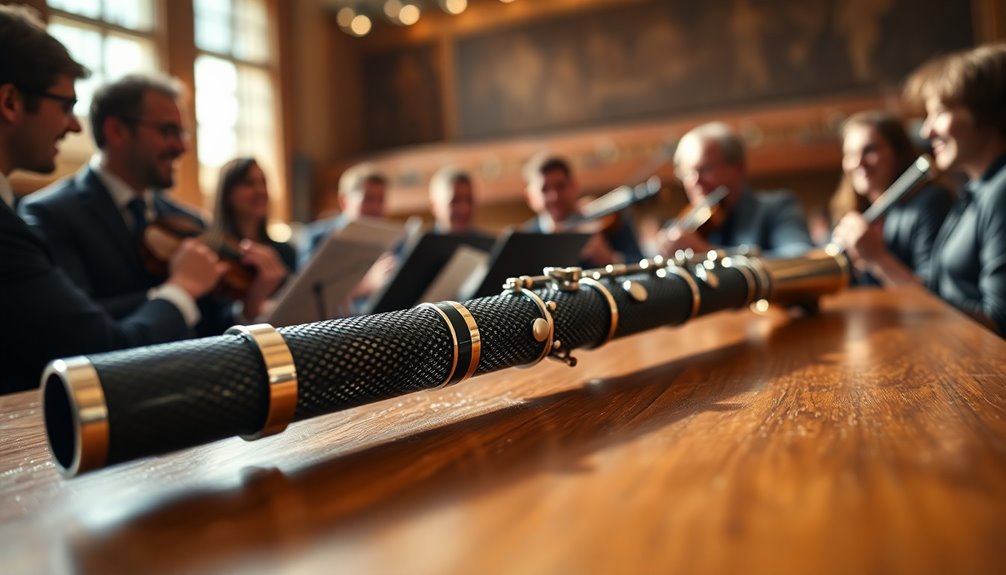
Hearing firsthand accounts from musicians can provide invaluable insights into the performance and feel of carbon fiber flutes. Many musicians have shared their experiences, offering valuable performance feedback that highlights the unique benefits of these modern instruments.
Here are three key points that stand out in their testimonials:
- Lightweight Comfort: Musicians appreciate the weight of carbon fiber flutes, which allows for extended playing sessions without physical strain. Many report that the lighter design enhances their overall comfort, especially during long rehearsals or performances.
- Durability and Stability: The resilience of carbon fiber has garnered praise from those who travel frequently. Musicians note that their flutes withstand temperature changes and humidity fluctuations better than traditional wooden flutes, ensuring consistent performance in varying environments.
- Enhanced Sound Quality: Feedback indicates that many players are pleasantly surprised by the tonal quality of carbon fiber flutes. Several musicians describe a rich, vibrant sound that rivals that of their wooden counterparts, allowing them to achieve the expressive range they desire.
Additionally, many players find that the closed-hole keys on carbon fiber flutes support finger placement similarly to nickel silver flutes, making them accessible for beginners.
These musician experiences illustrate that carbon fiber flutes aren't just a trend; they're a practical choice for serious players seeking durability, comfort, and superior sound.
Such testimonials help you understand the advantages of making the switch and how these flutes can fit into your musical journey. Embracing this modern material may just elevate your performance to new heights.
Frequently Asked Questions
Are Carbon Fiber Flutes Suitable for Beginners?
If you're a beginner, carbon fiber flutes can be a great choice.
They offer beginner advantages like durability and resistance to temperature changes, which means you won't have to worry about damaging your instrument.
Plus, they produce impressive sound quality, allowing you to focus on developing your skills without sacrificing tone.
Their lightweight design makes them easy to handle, helping you feel more comfortable and confident as you learn to play.
How Do Carbon Fiber Flutes Compare in Price to Traditional Flutes?
When you compare carbon fiber pricing to traditional flute costs, you'll notice that carbon fiber flutes often fall within a similar to slightly lower price range.
Traditional flutes can be quite expensive, especially high-quality models.
Carbon fiber provides a more budget-friendly alternative without sacrificing durability or sound quality.
If you're looking for a solid instrument that won't break the bank, carbon fiber flutes might just be the perfect choice for you.
Can Carbon Fiber Flutes Be Repaired if Damaged?
What if your flute gets damaged? You might feel a pang of worry, but fear not—carbon fiber flutes can often be repaired.
Skilled technicians employ various repair techniques that address cracks or dents effectively.
To prevent future damage, consider proper handling and storage practices. By staying vigilant, you can maintain your instrument's integrity and enjoy its vibrant sound for years to come, ensuring it remains a cherished part of your musical journey.
Are There Specific Brands Known for Beginner-Friendly Carbon Fiber Flutes?
When searching for beginner-friendly carbon fiber flutes, you'll find several brands stand out.
Look for options from companies like Azumi and Yamaha, known for their quality flute features tailored for newcomers.
These brands often provide excellent intonation, lightweight design, and user-friendly mechanics, making your learning experience smoother.
Do Carbon Fiber Flutes Come in Different Sizes and Styles?
Imagine playing a carbon fiber flute that perfectly fits your hands, allowing you to express your musicality effortlessly.
Yes, carbon fiber flutes come in various sizes and styles, catering to different player needs.
You'll find custom sizes designed for comfort and accessibility, along with design variations that range from sleek, modern aesthetics to more traditional looks.
This diversity guarantees you can find a flute that not only sounds great but feels right for you.
Conclusion
To summarize, carbon fiber flutes offer an innovative alternative to traditional instruments, boasting a remarkable strength-to-weight ratio—these flutes can be up to 60% lighter than their metal counterparts. This not only enhances playability but also allows for longer practice sessions without fatigue. As you explore this modern material, consider how its unique properties can elevate your musical experience, blending performance with durability in a way that resonates with today's musicians.



